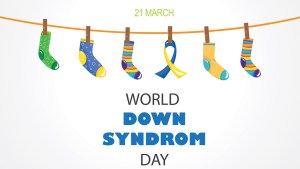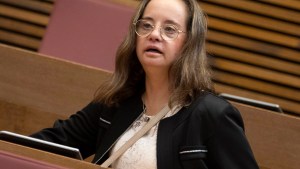When individual US states began imposing six- to 12-week limitations on abortion, they added increased pressure for parents to decide whether to abort a child who might have a birth defect, as some prenatal testing cannot be done before 12 weeks.
“What we have nowadays is people in a panic, people who are concerned about the ‘quality’ of their fetus, or the genetic conditions that might exist within their fetus, are concerned that they’re not able to test soon enough that they can arrange a termination if they don’t want to have that child,” said Mark Bradford, who was the founding president of the Jerome Lejeune Foundation in the United States.
Bradford, who is now a fellow at the Word on Fire Institute, said that in some states, such as Nebraska, there are legislative efforts to carve out exceptions to the limit for pregnancies where the child might have a condition that is “incompatible for life.”
“But we know the kind of slippery slope those laws slide on,” Bradford said at a side event during the Commission on the Status of Women at the United Nations last month.
The March 21 event – “Celebrating Ability: Investing in and Accompanying Children and Adults with Down Syndrome and their Families” – was sponsored by the Permanent Observer Mission of the Holy See to the United Nations and the Center for Family and Human Rights. “We have to be very careful in this moment that we’re in, where state-to-state decisions are being made on how we value the lives of individuals that have chromosomal abnormalities, to use the terms that are commonly used, how we value these individuals in our culture, and what we do to protect their lives in a culture that in many cases is intent on destroying them.”
Bradford, who had his son, Thomas, who has Down syndrome, next to him while he spoke, cautioned that we are living in a “delicate moment.”
“We’re living in a society of contradictions; we’re living in a society that wants to support individuals in some ways, in varying degrees … support them educationally, medically, in terms of their acceptance in society, etc. But we’re also living in a society that wants to encourage the destruction of their life,” Bradford said.
He pointed out that 63% of the members of the American College of Obstetricians and Gynecologists recommend or would recommend abortion for a prenatal diagnosis for a condition that is compatible with life.
“Not one that is incompatible with life,” he clarified, “but one that a family might see is inconvenient. It’s critical at this moment that we’re aware of what’s going on in the communities in which we live. And we advocate on behalf of these individuals to ensure their lives are productive and respected and welcomed and valued in the societies in which we live.”
“We don’t want your pity”
The program at the UN, held on World Down Syndrome Day, also included addresses by persons with the syndrome, which is caused by an extra chromosome on the 21st pair of chromosomes. Isabella Hass, a young model, spoke about her work as a public speaker, athlete, and student. Like many other young women, she enjoys traveling and going to the beach and considers herself a foodie. She spoke about the positive impact of being fully included in school. She learns from her peers, emphasizing “we all have things to learn and things to teach.” She underscored that “we are more alike than different. We don’t want your pity. We want to show you what we can do.”
Frank Stephens, a Down syndrome advocate and actor, said in his address, “If you remember only one thing from today, it’s that I am a man with Down syndrome, and my life is worth living.”
Stephens outlined how advancements since the mid-20th century have vastly improved lives for those with Down.
Yet challenges persist, exacerbated by the combination of prenatal testing and discriminatory attitudes. Stephens described the historical institutionalization and social isolation of people with Down, contrasting these practices with his fulfilling life filled with accomplishments, including advocacy and acting roles.
He countered the myth that Down syndrome lives are fraught with suffering, instead highlighting the richness and potential for a full life. He uses his speech earnings to support medical initiatives in Tanzania, illustrating his commitment to making a difference. He pointed to the strides made in societal inclusion and acceptance for individuals with Down syndrome while noting the ongoing need to update public information on the condition and address Alzheimer’s disease, which people with Down are at higher risk of, as critical challenges ahead.
Dr. Brian Skotko, director of the Down Syndrome Program at Harvard Medical School, spoke about the “reduction rate,” a measure that indicates the percentage of babies with a prenatal diagnosis of Down syndrome that were terminated due to the diagnosis. The reduction rate in the United States is 36% (babies who would have been born with Down syndrome but were aborted). He also noted that Americans with Down syndrome are living longer, with an average lifespan of about 60.
While the reduction rate has been increasing globally, Dr. Skotko said, the world is also seeing increases in the number of people with Down syndrome, primarily due to improved healthcare.
Vital support
Archbishop Gabriele Caccia, the Permanent Observer of the Holy See to the United Nations, in introductory remarks lamented that too often, society focuses on what people with Down syndrome cannot do rather than what they can.
“When we focus only on limitations, it becomes easy to decide that the costs outweigh the benefits of providing support and services,” Archbishop Caccia said. That is, while it may not be said openly anymore, there can be an attitude which asks ‘What is the point of investing in someone who will never contribute?’ These negative impressions can lead not only to a lack of resources and support for children and adults with Down syndrome, but also to a mindset that thinks it would be best to eliminate Down syndrome. But this elimination means the elimination of the people. Indeed, it is already going on. In certain countries, nearly 100% of parents of babies who receive a prenatal diagnosis for Down syndrome are choosing to end the life of their son or daughter.”
The archbishop said it is “vital” to offer support for mothers and families to welcome and care for children with Down syndrome, beginning with the provision of complete information regarding their children’s potential and their own ability to care for them.
“This must be accompanied by adequate social protection, specialized health care, as well as policies that help persons with Down syndrome to achieve their potential through social integration, education and job opportunities,” Caccia said.



